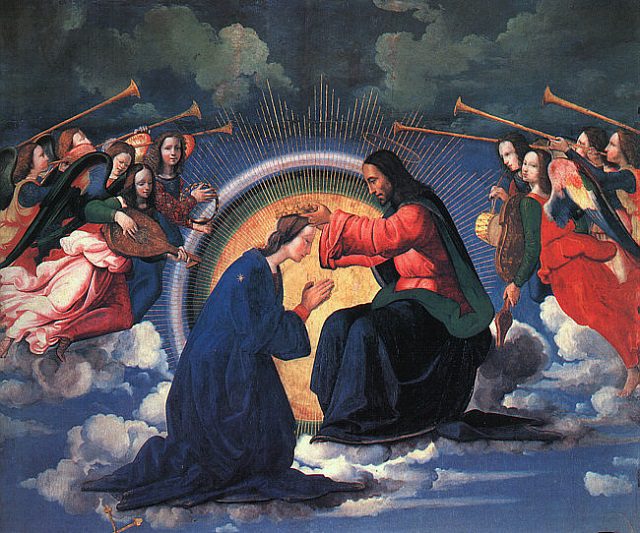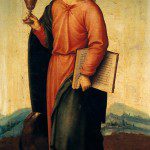
The Coronation of the Virgin with Six Saints (1504), by Ridolfo del Ghirlandaio (1483-1561) [public domain / Wikimedia Commons]
*****
[7-11-04]
***
The exaltation of Mary is the supreme example of how highly God sought to raise man. This is part and parcel (as the foremost and most extraordinary instance) of the notion of divinization or deification or theosis — a common motif, particularly in Orthodox thought, Catholic mysticism and spirituality, and the early Eastern Church fathers.
Matthias Scheeben (1835-1888), the extraordinary German Catholic mystic and theologian, explains this concept in the detail necessary to avoid huge misunderstandings:
By grace the first man was deified, but he was not made God or turned into God, if we may so speak. It is only in a figurative sense that the Fathers refer to the deified man as God, that is, as a different God by similarity, not by identity, but only in the sense in which we are accustomed to speak of the so-called parhelion or mock sun as the sun. When man, the original bearer and possessor of a purely human nature, became also the possessor and bearer of a share in the divine nature through grace, he did not become another, but remained the same person. He did not lose himself; he continued to belong to himself. By participation in the divine nature he only acquired a new possession, a new, higher, supernatural character, by which he was transformed into God’s image, was made like to God in a supernatural manner, and in consequence of this resemblance necessarily entered into a most intimate union and unity with the divine Exemplar . . .
(The Mysteries of Christianity, translated by Cyril Vollert, St. Louis: B. Herder Book Co., 1946; originally 1888 in German, 316-317)
Biblical indications for theosis are abundant:
1) The symbolic equation of Christ and His disciples (even all of mankind) is a most biblical concept:
. . . whoever receives one whom I send receives me; and whoever receives me receives him who sent me. (John 13:20; cf. Luke 9:48, Mark 9:37, Matthew 18:5 — NRSV)
. . . for I was hungry and you gave me food, I was thirsty and you gave me something to drink [etc.] . . . just as you did it to one of the least of these who are members of my family, you did it to me. (Matthew 25:35, 40)
2) In Scripture there is often taught a mystical (but almost literal) identification of the Body of Christ (the Church: 1 Corinthians 12:27, Ephesians 1:22-23, 5:30, Colossians 1:24) with Christ Himself. Jesus equated Paul’s persecution of the Church with persecution of Him (Acts 9:5; cf. 8:1,3, 9:1-2). This is incarnational theology.
3) 2 Peter 1:3-4 is the all-important verse in this regard:
According as his divine power hath given unto us all things that pertain unto life and godliness, through the knowledge of him that hath called us to glory and virtue: Whereby are given unto us exceeding great and precious promises: that by these ye might be partakers of the divine nature . . . (KJV; same clause in RSV / NKJV ; cf. John 14:20-23; 17:21-23)
4) Note also the following cross-exegesis (from RSV):
a) For in him the whole fulness of deity dwells bodily. (Colossians 2:9)
b) For in him all the fulness of God was pleased to dwell. (Colossians 1:19)
c) And from his fulness have we all received, grace upon grace. (John 1:16)
d) . . . to know the love of Christ which surpasses knowledge, that you may be filled with all the fulness of God. (Ephesians 3:19)
e) until we attain to the unity of the faith and of the knowledge of the Son of God, to mature manhood, to the measure of the stature of the fulness of Christ. (Ephesians 4:13)
f) But you are not in the flesh, you are in the Spirit, if in fact the Spirit of God dwells in you. Any one who does not have the Spirit of Christ does not belong to him. (Romans 8:9)
g) If the Spirit of him who raised Jesus from the dead dwells in you, he who raised Jesus Christ from the dead will give life to your mortal bodies also through his Spirit which dwells in you. (Romans 8:11)
h) What agreement has the temple of God with idols? For we are the temple of the living God; as God said, ‘I will live in them . . . ‘ (2 Corinthians 6:16)
i) and that Christ may dwell in your hearts through faith . . . (Ephesians 3:17)
j) for ‘In him we live and move and have our being’: as even some of your poets have said, ‘For we are indeed his offspring.’ (Acts 17:28)
k) For those whom he foreknew he also predestined to be conformed to the image of his Son, in order that he might be the first-born among many brethren. (Romans 8:29)
l) And we all, with unveiled face, beholding the glory of the Lord, are being changed into his likeness from one degree of glory to another; for this comes from the Lord who is the Spirit. (2 Corinthians 3:18)
(cf. 1 Corinthians 3:16; 2 Timothy 1:14; 1 John 4:12, 15-16)
The Greek word for “fulness” in all instances is pleroma (Strong’s word #4138). These references also suggest the notion of theosis, or deification: a participation in God’s energies and power, through the Holy Spirit.
5) The Catechism of the Catholic Church makes frequent mention of theosis or divinization: see #398, 460, 1129, 1265, 1812, 1988.
Pope John Paul II, in his General Audience of May 27, 1998, spoke about this aspect of theology and spirituality, in his talk entitled, “Spirit Enables Us to Share in Divine Nature”.
To summarize: it is plausible that God could and would bestow an extraordinary place upon Mary in His redemptive plan for the human race. If we are all potentially partakers of the divine nature, as St. Peter informs us, then how much more so the Blessed Virgin Mary, the Immaculate New Eve, the Theotokos? If we all can be potentially God’s fellow workers, urged on by God’s enabling grace to work out our own salvation, then why cannot Mary conceivably have been chosen by God to be a dispenser of His salvific grace and Mediatrix?
*****
Meta Description: Explanation of how theosis, or union of God, quintessentially applies to the Blessed Virgin Mary, especially as Mediatrix of all graces.
Meta Keywords: divine nature, theosis, mysticism, union with God, deification, divinization, Blessed Virgin Mary, Blessed Virgin Mary, Co-Redemptrix, distribution of graces, Marian doctrine, Mariology, Mary mediatrix













